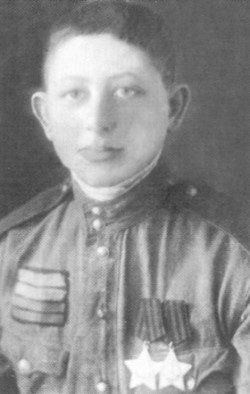Leonid Okun was born in Minsk in 1929. Thus, when the Soviet-German war started in June 1941 and the Germans entered Minsk, he was only eleven. Okun and his family did not succeed in leaving the city during the mass escape from it (they choose a wrong way and were intercepted by the Germans). As a result, in July 1941 they were imprisoned in the Minsk ghetto. In the winter of 1941-1942 Leonid became a messenger from the partisans to the ghetto. When escapes from the ghetto to the Soviet partisans began, he was one of the two dozen children guides who accompanied the escapees. Hersh Smolar mentioned Okun in his memoirs. However, what Smolar failed to mention was the fact that the Belorussian collaborationist police learned of Okun's activities and hanged his parents and siblings in the ghetto.
In 1942, Okun joined the Jewish family camp headed by Semion (Sholem) Zorin, also known Partisan Unit 106. Leonid in fact became Zorin's orderly. As a liaison man (of Unit 106) with other Soviet partisan units, Okun encountered many instances of antisemitism on the part of both non-Jewish rank-and-file partisans and commanders; he knew even more from his conversations with Jewish partisans in other units. In particular, he was struck by the unwillingness of almost all partisan commanders to accept Jews into the ranks of their fighters. In 1944 three Soviet agents came to Zorin and asked for a guide who knew the forests well; Zorin reluctantly agreed to give them Leonid Okun. Several days later, Okun crossed the front lines together with these men and joined the Red Army (the 153th Infantry Division).
Okun served first as a rifleman, then as a scout. He received his first military award, The Order of Glory, for capturing a German officer during a scouting raid. Okun stunned the officer with the butt of his rifle and then dragged him 300 meters back to a Soviet position. He relates: "I dragged him about three hundred meters across "no man's land" and then our guys noticed me and crawled toward me, with scouts from our platoon helping me to drag the prisoner. When they saw that the prisoner was an officer, they rushed to embrace me warmly, saying - "Wow, our little Yid! Tough fellow! What a strange thing he managed to do!" (Interview given in Israel in the 2000s). Okun was also recommended for other military awards, such as The Order of the Red Banner and The Order of the Red Star, but he was not awarded them.
After the war, Okun lived in Minsk. In 1985, when the USSR was celebrating the 40th anniversary of the victory in World War II, the Soviet authorities began to award all surviving veterans the Order of the Patriotic War. When he submitted his documents to the district military commissariat to confirm his right to receive the award, Okun was insulted by an antisemitic military commissar, who claimed that Okun either bought his military awards or forged his military records. In the early 1990s, Okun left the USSR for Israel in the early 1990s. He died in 2015.
From the interview that Leonid Okun gave in Israel in the 2000s:
"I was extremely happy that I was allowed to remain at the front. I was interested in revenge and only revenge. When I was killing the next enemy, when I was pressing the trigger of my rifle, I always said in a whisper: "This one is for my mother; this one – for my sister; this one – for my brother!" I killed for each one of my relatives who were annihilated by the Nazis… When the war ended, I had long worried that I had not killed enough of them...
Q.: Did your nationality [ethnicity] in some way affect the attitude of your fellow-servicemen to you while you were serving in the Red Army?
A.: In the army, at the front, the national question was not as acute as in partisan groups, or in the rear. In the reconnaissance [units], there were always serving good, genuine Russian people with a good heart.
No, in the army in this respect, it was tolerable. As for minor matters, this did occur several times. But basically, their attitude to me was excellent, everybody saw a young Jew fighting with the reconnaissance, killing enemies, and being wounded many times…. I believe that the soldiers of the national minorities in Central Asia, those in the army, suffered from mockery and chauvinist remarks from individual soldiers and officers no less than did the Jews.
(The interview can be found on iremember.ru)







